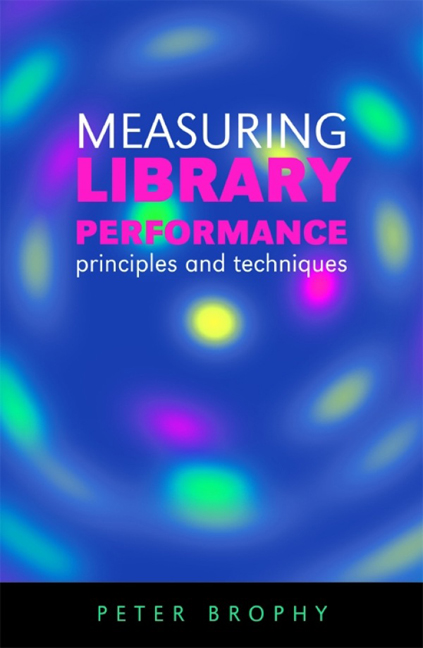Book contents
- Frontmatter
- Contents
- List of figures
- List of tables
- Preface
- Acronyms and abbreviations
- 1 Background
- 2 Theoretical considerations
- 3 User satisfaction
- 4 Impact on users
- 5 Social and economic impact
- 6 Inputs
- 7 Processes
- 8 Outputs
- 9 Staff
- 10 Infrastructure
- 11 Services for all
- 12 Benchmarking
- 13 The balanced scorecard
- 14 Standards
- Appendix 1 Data collection methods
- Appendix 2 The analysis of data
- Appendix 3 The presentation of results
- Index
Appendix 1 Data collection methods
Published online by Cambridge University Press: 08 June 2018
- Frontmatter
- Contents
- List of figures
- List of tables
- Preface
- Acronyms and abbreviations
- 1 Background
- 2 Theoretical considerations
- 3 User satisfaction
- 4 Impact on users
- 5 Social and economic impact
- 6 Inputs
- 7 Processes
- 8 Outputs
- 9 Staff
- 10 Infrastructure
- 11 Services for all
- 12 Benchmarking
- 13 The balanced scorecard
- 14 Standards
- Appendix 1 Data collection methods
- Appendix 2 The analysis of data
- Appendix 3 The presentation of results
- Index
Summary
■ Introduction
This appendix contains descriptions of the main methods used in libraries for collecting data in support of performance measurement. This, together with the succeeding appendices on data analysis and the presentation of results, is intended to offer practical advice to those engaged in designing and carrying out assessments of library services.
Comments in the earlier parts of this book on data collection methods should be read in conjunction with these appendices. In particular, care should be taken to select methods which are appropriate to the question being asked and the differences between quantitative and qualitative methods should be borne in mind. Further, it is important to bear in mindhow the data will be analysed and presented when selecting methods for data collection. There is no point in gathering sets of data which cannot be analysed, either because the tools are not available or the resource implication is too great.
It is assumed that before deciding on a method to use, and before designing a data collection instrument, an overall evaluation plan will have been put in place. Chapter 1, ‘Background’, outlines the elements that such a plan should cover.
■ General issues about surveys and other data collection methods
It is appropriate to begin with some general advice about the conduct of surveys and other data collection methods. This is presented in the form of ten golden rules of data collection and applies particularly to methods involving human subjects.
Always observe strict ethical standards and in particular never do anything which could subject a data subject to harm, humiliation or embarrassment. Where necessary obtain permission in advance to carry out a survey or other data collection exercise. Allow participants to withdraw at any stage, without demanding a reason.
Always explain the exact purpose of any survey and the use to which data gathered will be put.
Explain who you are and always provide contact details.
Do not assume knowledge on the part of respondents. Explain everything clearly. Keep language simple and unambiguous.
Arrange questions in a logical sequence. Ask one question at a time.
Avoid leading questions which might suggest what is the ‘right’ answer.
- Type
- Chapter
- Information
- Measuring Library Performanceprinciples and techniques, pp. 175 - 215Publisher: FacetPrint publication year: 2006



